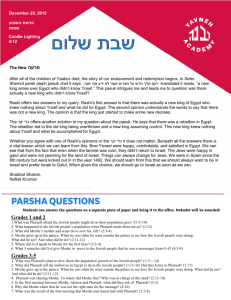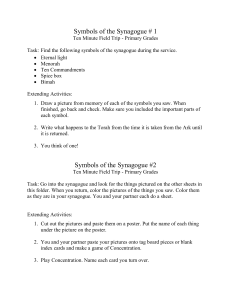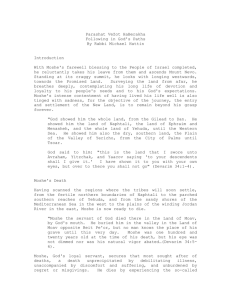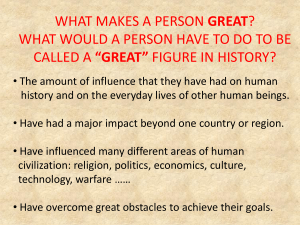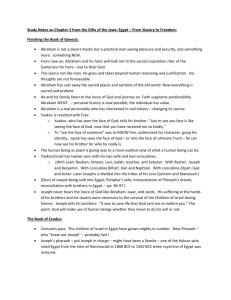Is MLK Day a Jewish Holiday - Rabbi Shmuel's Thoughts on Torah
advertisement
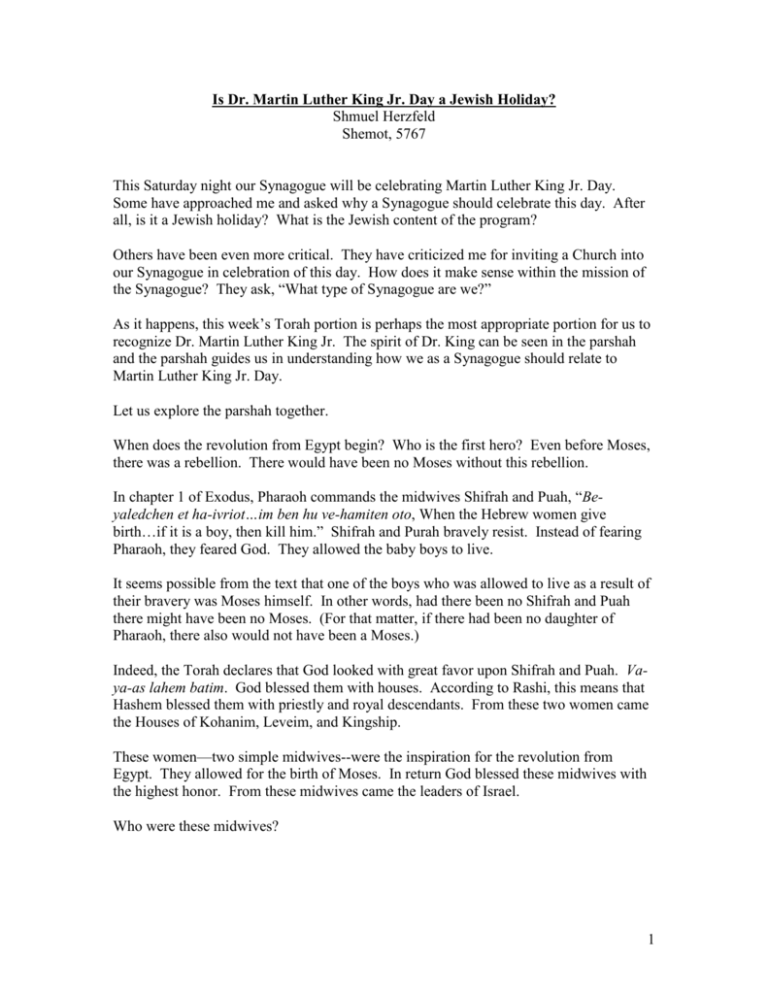
Is Dr. Martin Luther King Jr. Day a Jewish Holiday? Shmuel Herzfeld Shemot, 5767 This Saturday night our Synagogue will be celebrating Martin Luther King Jr. Day. Some have approached me and asked why a Synagogue should celebrate this day. After all, is it a Jewish holiday? What is the Jewish content of the program? Others have been even more critical. They have criticized me for inviting a Church into our Synagogue in celebration of this day. How does it make sense within the mission of the Synagogue? They ask, “What type of Synagogue are we?” As it happens, this week’s Torah portion is perhaps the most appropriate portion for us to recognize Dr. Martin Luther King Jr. The spirit of Dr. King can be seen in the parshah and the parshah guides us in understanding how we as a Synagogue should relate to Martin Luther King Jr. Day. Let us explore the parshah together. When does the revolution from Egypt begin? Who is the first hero? Even before Moses, there was a rebellion. There would have been no Moses without this rebellion. In chapter 1 of Exodus, Pharaoh commands the midwives Shifrah and Puah, “Beyaledchen et ha-ivriot…im ben hu ve-hamiten oto, When the Hebrew women give birth…if it is a boy, then kill him.” Shifrah and Purah bravely resist. Instead of fearing Pharaoh, they feared God. They allowed the baby boys to live. It seems possible from the text that one of the boys who was allowed to live as a result of their bravery was Moses himself. In other words, had there been no Shifrah and Puah there might have been no Moses. (For that matter, if there had been no daughter of Pharaoh, there also would not have been a Moses.) Indeed, the Torah declares that God looked with great favor upon Shifrah and Puah. Vaya-as lahem batim. God blessed them with houses. According to Rashi, this means that Hashem blessed them with priestly and royal descendants. From these two women came the Houses of Kohanim, Leveim, and Kingship. These women—two simple midwives--were the inspiration for the revolution from Egypt. They allowed for the birth of Moses. In return God blessed these midwives with the highest honor. From these midwives came the leaders of Israel. Who were these midwives? 1 Rashi teaches that they were really Yocheved, the mother of Moshe, and Miriam, the sister of Moshe. This is difficult to understand, since why then does the Torah call them Shifrah and Puah. In fact the names Shifra and Puah sound like they are Egyptian names. Thus, a second approach offered in the first century by Josephus and in the nineteenth century by Malbim argues that Shifrah and Puah were really Egyptian women. This approach seems much more in tune with the literal text of the Torah. The upshot of it all is that according to Malbim, the first act of resistance on behalf of the Hebrews was done not by Hebrews but by Egyptians. These Egyptian women were able to look beyond their own immediate needs and even the needs of their own family; even more than that they acted bravely for another family and another nation. The lesson of the Shifrah and Puah story is that in order for the Children of Israel to be liberated there needed to be brave and caring people who acted for “the other”. Shifra and Puah didn’t look the other way to save themselves; they didn’t put their loyalty to their boss in front of loyalty to God. They didn’t do the safe thing; they did the right thing. Part of the Exodus story is that we must be grateful and inspired by people like Shifrah and Puah. But the lesson of Shifrah and Puah is deeper than that. The lesson goes to the very character of Moshe. Why was Moshe selected to be the leader of the Jewish people? What do we know about Moshe’s life? The first thing Moshe does as an adult is he stands up for an Israelite who was being beaten by an Egyptian. He smites the Egyptian down. But after that, he is still not selected as a leader. Then, Moshe interferes when he sees two Israelites quarreling, but he is still not selected as a leader. He then runs to the land of Midian and steps in when he sees the daughters of Yitro being oppressed by the shepherds. Says the text, “Vayoshian,” he saves them.” Then—and only then--is he selected as our leader. Only once Moshe has shown the ability to look beyond his own narrow cause is he deemed worthy of being our liberator. The lesson of Moshe’s selection as our leader goes beyond the Shifrah and Puah story. In order to achieve redemption one must look beyond the immediate needs of your own people. People often say, “Anything that distracts from our main mission must be avoided. Don’t take up the cause of others because it will prevent us from focusing on our own needs.” This approach is a mistake. In order to best fulfill our own needs we need to also be cognizant of the needs of others. 2 Martin Luther King Jr. acted with great bravery and courage for blacks in this country. He put his own body on the line. He spoke truth to power. He inspired and he fought. But what separates him from many other great leaders is that he was able to also transcend his own personal cause. To give some perspective: The greatest work for the Soviet Jewry movement was done by the Student Struggle for Soviet Jewry. One of its founders was Glen Richter. Glenn shared with me that in 1965 the leaders of Student Struggle for Soviet Jewry went to Dr. King and asked for his help in speaking out against the Soviet Union. Rabbi Avi Weiss the leader of the group related that Dr. King’s closest advisors urged him to remain silent. They said, “It is not your cause. Stay focused.” Thankfully, he did not listen to them. Instead—at a critical moment--he spoke in support. He ended up issuing a stronger statement on behalf of Soviet Jews than some Jewish groups were willing to issue at that time. He taught us that where there is injustice anywhere, there is injustice everywhere. He taught us that the opposite of good is not evil, it is indifference. There is a third lesson in the Exodus story that relates directly to the teachings of Dr. King. The lesson is simple: If we are silent when we see evil it will not be long before such evil will rear its ugly head upon us. Pharaoh first decreed, “beyaledchen et havriot,” i.e., when the Hebrew women give birth kill their baby boys. But then Pharaoh saw that his own people tolerated this evil. A later verse says, “Va-yetzav paroh lekhol amo leimor kol ha-ben ha-yilod ha-yeorah tashlichuhu, Pharaoh commanded his people, ‘any male that is born should be cast into the sea.” Rashi points out, “af aleihem gazar.” Pharaoh is no longer only persecuting the Israelite babies; he is now killing his own people! The decree had started out against one group but eventually spread to encompass the Egyptians as well. When one sees evil in the world one must speak out. An injustice against anyone is an injustice against everyone. The Torah teaches that these are not mere words. This is a prophecy. If injustice is not stopped it will spread like a forest fire and engulf all the bystanders. For these reasons it is a great honor to have a Martin Luther King Jr. program as a core value of our congregation. Not only are we giving honor to a brave man who fearlessly lived these lessons of the Exodus story, but we are also reminding ourselves that the lesson he taught is intertwined with the lesson of the Torah: In our quest to achieve our own redemption we must see the needs of others. Without such sight, we will forever be blinded from the presence of the messiah. These are the words of Dr. King on June 23, 1963. They surely apply to us as well: 3 “We’ve been pushed around so long; we’ve been the victims of lynching mobs so long; we’ve been the victims of economic injustice so long—still the last hired and first fired all over this nation. And I know the temptation. I can understand from a psychological point of view why some might get caught up in the clutches of the injustices surrounding them almost respond with bitterness and come to the conclusion that the problem can’t be solved within, and they talk about getting away from it in terms of racial separation. But even though I can understand it psychologically, I must say to you this afternoon that this isn’t the way. Black supremacy is as dangerous as white supremacy. And oh, I hope you will allow me to say to you this afternoon that God is not merely interested in the freedom of black men and brown men and yellow men. God is interested in the freedom of the whole human race.” What an honor it is to celebrate the life of this man in our Synagogue! 4
